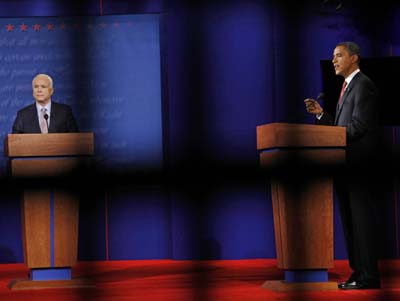
Barack Obama and John McCain will both pursue the image of a
strong leader in troublesome economic times as they meet Wednesday
night for their third and final presidential debate.
Barack Obama and John McCain will both pursue the image of a strong leader in troublesome economic times as they meet Wednesday night for their third and final presidential debate.
Their face-off comes as Obama widens his lead in typically Democratic states and campaigns with an air of optimism about his prospects, while McCain seeks a way to gain ground and finds himself defending traditionally Republican states with less than three weeks left in the race.
“We cannot spend the next four years as we have spent much of the last eight: waiting for our luck to change. … As president I intend to act, quickly and decisively,” McCain said Tuesday in battleground Pennsylvania. There, he unveiled new economic proposals and previewed a possible debate strategy: argue that he would be different from Bush and better than Obama.
One day earlier in swing state Ohio, Obama outlined his own economic plan and showed off his own pitch. He suggested that McCain was more of the same and that putting a Democrat in charge was the only way to fix the economy’s woes: “It will take a new direction. It will take new leadership in Washington. It will take a real change in the policies and politics of the last eight years.”
The economic crisis has transformed the campaign over the past month. Obama has built leads nationally and in key states as the turmoil has returned the nation’s focus to the unpopular Bush’s policies. Now, the burden is on McCain to try to reverse his slide.
Wednesday’s debate at Hofstra University in Hempstead, N.Y., is slated to focus entirely on the economy and domestic policy. The candidates will be seated at a table with moderator Bob Schieffer of CBS.
Both presidential contenders have used the previous debates to make and remake their main campaign points, frequently sidestepping direct questions such as how they would have to scale back their long lists of campaign promises in light of the economic crisis.
Advisers for each candidate say he will use the final debate to lay out his vision for the country and promote his economic policies while drawing differences with his opponent.
Character attacks – subtle or not – also could occur.
Obama has increasingly labeled McCain “erratic” and “lurching” during the economic crisis. The words suggest unsteadiness on the part of the 72-year-old four-term senator.
The Democrat’s campaign released a pre-debate memo Tuesday that argued McCain was “ill-equipped” to lead during this crisis, saying his response “has careened, sometimes changing course within the span of a single day.”
McCain has accused Obama of lying about his association with 1960s radical William Ayers, a founder of the violent anti-war group Weather Underground. Obama was 8 years old when the Weather Underground claimed responsibility for a series of bombings. Now a professor in Chicago, Ayers hosted a meet-the-candidate session at his home for Obama as he prepared to run for the state Senate. Later, the two worked with the same charity and social-service organizations in Chicago.
McCain has softened that attack on the campaign trail in recent days, though not in his TV and radio ads.
His campaign assailed Obama’s on Tuesday for its “failure to explain how it is that Barack Obama carried on a decade-long friendship with a man who sought to topple the U.S. government through violence.”
McCain has solidified and energized his base of Republican voters, but he has problems with his support among swing-voting independents. A recent Associated Press-GfK Poll showed them divided about evenly between the two candidates. That’s a problem for McCain because Democrats decisively outnumber Republicans this year.
Compounding McCain’s woes, new Quinnipiac University polls released Tuesday showed Obama leading by double digits in two states that Democrat John Kerry won four years ago and that McCain is trying to put in his column this year – Wisconsin and Minnesota – as well as in Michigan, which McCain abandoned earlier this month.
Also, McCain running mate Sarah Palin is being dispatched to campaign in usually Republican states such as Indiana, North Carolina and Virginia to shore up GOP support. However, McCain campaigned Tuesday in Pennsylvania and was to return there Thursday as well, a signal of the campaign’s sustained effort to try to pick off that Kerry-won state offering a whopping 21 electoral votes.
To win, 270 are required.
McCain’s strategy relies on keeping Florida, Missouri, North Carolina, Virginia, Indiana and Ohio in the GOP column along with 21 other Bush-won states that aren’t seriously contested. That would give McCain 260 electoral votes. He would then have to win 10 more votes from a pool of contested states won by Bush (Colorado, Nevada and New Mexico) and Kerry (New Hampshire, Wisconsin and Pennsylvania).
Polls show Obama leading or tied in all of those.








